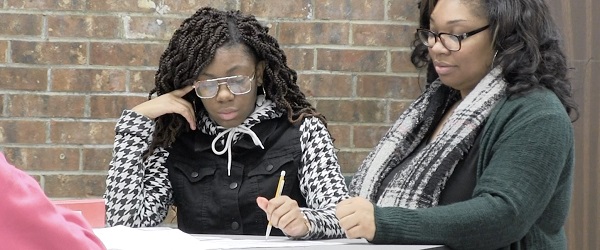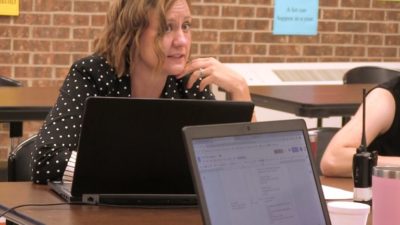

Delmonika Vick always wanted to be a teacher, and she got an education degree. But other opportunities kept coming along, and she found herself in corporate banking for four years — only to realize, several years in, what a struggle it was to go to work each day.
“I didn’t have any sense of fulfillment — I didn’t feel like I was making a difference,” Vick said. “I knew that I was supposed to teach, then — I knew that I had to pursue education.”
An Edgecombe County, North Carolina native, Vick intended to go straight into a classroom teaching role, until a chance meeting with Principal Donnell Cannon led to an offer to be a reach associate (RA) at North Edgecombe High.
As advanced paraprofessionals, reach associates support a multi-classroom leader’s small teaching team in Opportunity Culture schools.
Crucial to supporting excellent teachers who extend their reach to many more students, RAs in most cases fill two primary roles. They work independently with groups of students so that the multi-classroom leader (MCL) and teachers can help more students without increasing instructional group sizes — by supervising time on projects, skills practice, and digital learning, and/or by instructing students in small groups or individually. They also help the MCL team complete non-instructional duties to create more time for planning and collaboration. During these activities and instruction, RAs help develop students’ social-emotional skills as well.
With several teaching job offers already in hand, Vick first resisted the idea of becoming an RA. But after researching it, “I accepted the position, which has led me into going into the classroom as a stronger teacher than I would have been if I went with my initial plan to go straight into the classroom,” she said. “I was going to do it for one year, but I loved the role so much I ended up doing it for two.”
In her second year, knowing that she still aimed to become a classroom teacher, she began co-teaching two math blocks with MCL Amy Pearce as well as supporting the math teaching team. Today, she’s busy preparing lesson plans and looking forward to her first year as a North Edgecombe Math 1 and 2 teacher.
The combination of experience she got as an RA — leading small groups for several teachers, connecting with about 80 students, and broadening her content knowledge — proved especially powerful preparation for leading her own classroom, Vick said.
For example, “I realized as I went along that planning was so, so important — especially collaborative planning.”
As a new RA, Vick attended the math team’s planning sessions, “but I would sometimes walk away not knowing exactly what I was supposed to do. I realized I would have to take initiative to see the need and meet the need. The role was still new to the school, and I hadn’t realized the flexibility of the role — I needed to learn what each teacher needed, and once I realized that, I was able to adapt more.”
Vick helped facilitate Opportunity Culture trainings this summer for new reach associates. “I always tell participants in summer training, what I wish I would have known was the amount of flexibility that I had — I didn’t fully understand or know what to do with the flexibility. But once I realized, I was like, ‘man, let’s go!’ I’m going to miss that role, because I loved the flexibility.”
Vick realized early on that while she knew she was there to be a support, not a full teacher, students made no such distinctions. As another adult there to support them, “those kids just saw me as a teacher,” she said.
She quickly came to realize and appreciate how much the team valued her role.
“You are not a teaching assistant,” she tells new RAs. “You are a reach associate, an advanced paraprofessional. You are going to be seen as a teacher in that space, and your voice has value — use it, and advocate for yourself and students. You are not just in charge of administrative duties and behavior management — you are so much more than that.”
Looking forward to fall
Especially after school shut down in the spring, Vick realized how valuable strong relationships with students are.
As she faces a fuzzy future for in-person teaching this year, Vick is thinking about how to build relationships and address the trauma students are experiencing this year—with students new to high school and to her.
“I know that I have to figure out how to tackle that head on — no way am I going to brush it to the side or minimize it. With thinking about how I’m going to build relationships, that’s the biggest part of what comes to mind — not so much the educational side but the trauma. What can I do to create a space where they feel safe virtually, and where they feel comfortable enough to talk about those things?”
Part of what drew Vick to North Edgecombe was the strong focus on loving and serving students. “You can just feel the love in that school building, from the office to going down the hallway to the classrooms. When I sat in on a meeting [before joining the school] and listened to conversations with students about things like social and racial injustices — I didn’t have those conversations in school — I knew this was a place where kids were valued,” she said. “It was what I needed to be a part of — the best decision I ever made in my life.”
For simple tools to help address students’ trauma when returning to school this fall, see new publications from Public Impact here. For more about residencies that allow aspiring teachers to learn on a multi-classroom leader’s team while serving as a reach associate or novice teacher, see here.


